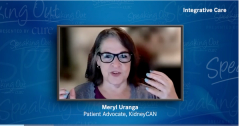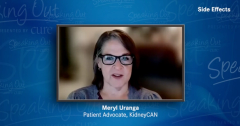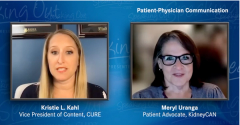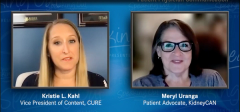
Patients Should Stay Educated on the Growing Treatment Options for Kidney Cancer
As a part of its Speaking Out video series, on behalf of KidneyCAN, CURE® spoke with Meryl Uranga about the importance of patients being their own advocate when communicating with their physician.
Kristie L. Kahl: With so many treatment options available for patients with kidney cancer in first, second, third and fourth lines, why is it so important for patients to stay informed on their options?
Meryl Uranga: I think your introduction kind of explains it all. (Treatments are) coming. They're coming out fast and furiously thankfully. Thank goodness because just a few years ago, we really didn't have a lot of options with kidney cancer. And so the landscape has changed so dramatically in the last five years with treatment options that it's absolutely critical for a patient who is advocating for themselves to understand what is the right order of things for them, what is the best option for them, that there may be underlying conditions that may not be compatible with some kinds of treatment drugs where others would be. There's just there's so many bells and whistles that need to be addressed there that it's pretty critical that you understand that and that you find the resources that you need to keep on top of it.
Kahl: Why do recommend that patients ensure that they learn about their options, but moreover what’s the best way for them to do so?
Uranga: That's a great question. And there's, I think, a couple of parts to that answer. The first part is they need to learn because it's their life, their well-being, their quality of life and their longevity of life at stake. So, what could be more important, you're going to research about putting curtains in your house or, you know what kind of car to buy, why would you not just not have any deep understanding and knowledge and critical research done for something that's potentially going to save your life and more than that, give you a quality of life while you're while you're there.
And so, there are options. There are a lot of resources out there. Personally, I started my journey into learning with a website called Smart patients, it's a support group and I found it as a support group. But by the name of it, you can kind of get an understanding of the business, this is not your average support group. There is emotional support, and we all go through the same thing and there's a lot of that going on there. But the general gist of it is that these are very informed patients and caregivers that want the information and so there's a lot of evidence based research shared there. And for me, it just cracked my whole world open because I understood in a way that I hadn't before what I needed to do where I needed to go, the type of knowledge that I needed to digest. And it also led me to KidneyCAN, and with KidneyCAN there are many, many, many resources that exist for patient advocacy and empowerment.
The first step is learning about the disease. And then there's a lot of references on the KidneyCAN website. It's actually called a patient resource center and it saves all the frustration of searching for studies, it's all trusted resources on there. So I highly recommended it, I know I am representing KidneyCAN and that's for a reason because I truly believe and support the work that's been done there. I believe it's made a huge difference in my own life and can for others as well and that's why I'm here.
And for the long term, there's the opportunities to advocate for research funding. Through that I have learned so much about what it takes for drugs to become FDA approved, what clinical trials actually do and what that process is. And how critical research funding is and that's why we all are doing this work, to make sure that those dollars are flowing because we have seen a difference that they've made in the last years. There's townhall events, where very highly specialized physicians and researchers speak and educate patients. We just started an (initiative) not too long ago. It's really fun and I've been working on it. It's called kidney candid. And it's part of KidneyCAN 's YouTube channel and these are just messages from top oncology professionals, caregivers — my son did one talking about his experience with me and what he recommends to people who are beginning that journey of being a caregiver — these short candid videos, they're very educational we try to make them that way. And KidneyCAN partners with CURE® and other organizations to make sure that that information is out there and so I just say dig into those kinds of resources. You want to read the studies. I have a email that comes from my mailbox every Friday that sums up all the news and all the data that's been revealed that week, and it's been so helpful because when some of this stuff comes into the marketplace, and it's available (you can talk to your doctor about it). The treatment I'm on right now, for example we started my fourth year on it and I remember when it was still in clinical trials that I read about it and I went to the oncologist and said I remember the stats I remember the numbers on this, this is something I think that would be good for me and that's a perfect example of partnering with your physician. And it's been very successful for me, thank goodness, for this long and hopefully a long, much longer time as well.
Kahl: Taking a look back at your pre-cancer self, what is one thing you wish you knew about treatment before you started it?
Uranga: I wish I knew that it wasn't as debilitating as it is sometimes portrayed. I have found and of course, this is just my experience, but I'm on my second line treatment and I've had plenty of issues and I've had some debilitating side effects. But they are manageable, and you can live your life, you can thrive, you can go to next level. So, when I was first diagnosed, I really thought okay, well I'm going to be on cancer treatment for, as long as I'm still alive and I mean basically I'll be just surviving. Not true at all. And I wish I had known that it would have saved me a lot of time of angst and anxiety about what my future life was going to look like. It's actually pretty darn good.
Kahl: What is your biggest piece of advice to help other patients learn more about treatment options?
Uranga: I think that there are multiple factors there too, the number one being just again, I can't stress it enough, educate yourself. Be on top of the news, be on top of the studies. Being on a smart patients type support group where people share that information all the time. If you don't feel capable or are even that interested in doing that kind of legwork yourself there are plenty of people doing it you just have to tap into it. But know what it is so that you're able to discuss that with your physician and that you're able to know what the quality of life is going to be and the things that you can do to manage your quality of life. Those are all really important. And the physicians know but they know from on paper. They don't know the reality of what it's like every day they know what the pharmaceutical company lists as side effects, whereas you know exactly how you feel. And so, you have to communicate, how you're doing, what you need help with, where you might need breaks, where you need management of their side effects, and together they can be very well managed, even the harshest of some of them that I know a lot of people who live very good lives on. You just have to not be afraid to work with your team on it.
Transcription edited for clarity.








